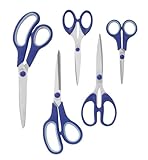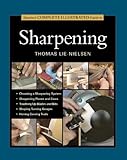3 Ways to Bring Old, Dull Scissors Back to Life
 With the advent of inexpensive, mass-produced metal implements for the home and farm, the necessity of making things last and getting extended use out of them had fallen to the wayside a great deal in the first world. However, there is now an increased interest in economic value as well as environmental frugality. I came across these simple tips for sharpening scissors without a sharpening stone or file in an old farmer’s handbook and thought I’d share. This technique is only for plain scissors, and should not be used on serrated or fancy edge scissors and NEVER with a knife.
With the advent of inexpensive, mass-produced metal implements for the home and farm, the necessity of making things last and getting extended use out of them had fallen to the wayside a great deal in the first world. However, there is now an increased interest in economic value as well as environmental frugality. I came across these simple tips for sharpening scissors without a sharpening stone or file in an old farmer’s handbook and thought I’d share. This technique is only for plain scissors, and should not be used on serrated or fancy edge scissors and NEVER with a knife.
Make sure your scissors are clean and dry, removing any oil, grease, rust or other residue. As should be the case when handling any tool, exercise caution and if need be, wear gloves, to prevent accidents.
Glass Bottle Sharpener
Select a glass bottle with no chips, nicks or cracks in it. Ones with thick rims, like soda bottles, are excellent for this purpose. Make believe you are trying to cut it (have one blade in and the other outside of the top of the bottle) and then allow the scissors to glide off the hard surface naturally, just as if you were trying to cut the glass. Use firm but not too hard pressure, and repeat the operation several times. You should notice a marked improvement when you next use the scissors on cloth or paper.
Sandpaper Method
Select the finest grade wood sandpaper you have, even used sandpaper with fine wood dust in it can be used so this is a great way to get one last use out of sandpaper you’d otherwise throw out. Cut thin strips from the paper using the full cutting length of the scissors. By cutting strips as thinly as possible you will get the maximum number of “passes” with your scissors and thus the best results.
Aluminium Foil Method
Just as with the sandpaper method, you want to cut long, thin strips. I’m not sure why, but I’ve been told that aluminium foil produces better results than tin foil (if you actually have any of that still around in this day and age). The waste foil can be balled up and used again to clean oven racks and barbecue grills before being consigned to the recycling bin.
Additional Research:
   |
Leave a Reply